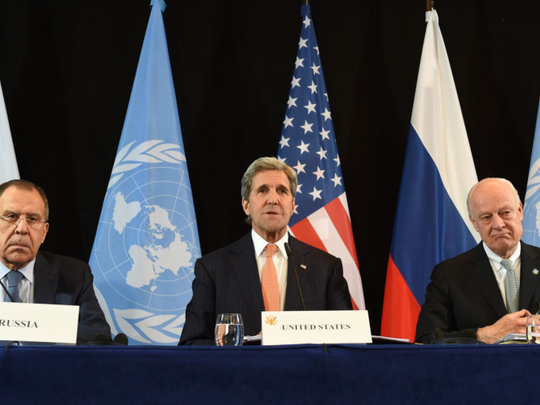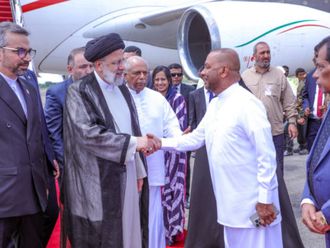
The US, Russia and other powers backed an accord calling for a truce in Syria’s civil war to take effect in a week’s time, as well as immediate delivery of humanitarian assistance to besieged areas.
Aid drops can begin as early as this week to some of the worst-hit areas, US Secretary of State John Kerry said, sitting next to Russian Foreign Minister Sergei Lavrov at a press conference in Munich after day-long talks with global and regional powers. The truce won’t apply to Daesh militants or Al Nusra, two militant groups fighting against the regime of Syrian President Bashar Al Assad. They and any others designated as terrorists by the United Nations Security Council will continue to be subject to attacks.
A sense of urgency surrounded Thursday’s negotiations among the 17-nation International Syria Support Group in the Bavarian capital. Syria’s five-year civil war has already left about 250,000 people dead and caused the biggest migrant crisis in Europe since World War II, as well as a growing threat from terrorist attacks.
Now, six months into Russia’s intervention in the conflict on Al Assad’s side, the Syrian regime is steadily gaining ground. Its troops threaten to retake the rebel stronghold of Aleppo, once Syria’s most populous city. The UN estimates more than 460,000 people are living in besieged cities and towns, and the recent advances by Al Assad’s army have already triggered an exodus of Syrians from nearby areas, with the potential to worsen the refugee crisis.
Starvation Threat
Nations taking part in the Munich talks include Saudi Arabia and Turkey, key rebel supporters whose stated readiness to send troops into Syria has added to concerns about an escalation.
Russian and US planes will both participate in aid drops, delivering to different parts of Syria. Staffan De Mistura, the UN envoy for Syria, said it’s possible the airdrops may not start until Tuesday. A UN working group will monitor implementation of the accord.
‘Pause’ in Conflict
Kerry said that while there was “unanimous” agreement on humanitarian measures in Munich, the truce represents a “pause” in the conflict rather than an agreement to end it.
“Putting an end to the bloodshed is essential as is to provide Syrians who are starving with the humanitarian aid that they need,” Kerry said. But the violence would only come to an end if “the parties engage at the table in a genuine negotiation.”
UN-brokered peace talks between the Syrian government and opposition broke down last week as Al Assad’s Russian-supported encirclement of Aleppo stoked the exodus of Syrian refugees. The US and its regional allies have blamed Russian bombardment of the rebels for worsening the humanitarian situation.
Russia says it’s acting in line with a December UN resolution permitting military action against groups designated as terrorists. Lavrov said that Al Assad’s campaign in Aleppo is a legitimate effort to regain control of territory seized by illegal groups.
‘Evil Plans’
Outside forces should abandon the “illusion” that changing the Al Assad regime will stabilize Syria, he said. “The main task is to stop Daesh militanst from carrying out their evil plans.” Kerry insisted that the fight against the terrorist group, which has used its stronghold in Iraq and Syria as a base to expand into other countries and carry out attacks in France, Egypt and Lebanon, goes hand in hand with the need for a new political system in Syria.
The main Syrian opposition groups backed by the US, Saudi Arabia and Turkey have said that delivery of some aid and an end to airstrikes by Al Assad and his Russian allies are conditions for resuming talks on a settlement. A key stumbling block has been whether Al Assad can remain in power, and there have also been disputes over which groups should be allowed to take part in talks, with Russia backing the right of Syria’s Kurdish movement and other groups less hostile to Al Assad to have a say.
The talks should be held “without any ultimatums or preconditions” and include “a wide cross-section” of opposition groups, Lavrov said at the press conference. He said Russia will use its influence over the Al Assad government to press for the cessation of hostilities.












